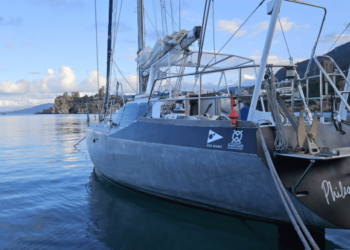Old nets? New ropes! – Combining research and industrial expertise from across Europe, the EU-funded SEARCULAR project is testing circular solutions for fishing gear that, if scaled up, could prevent thousands of tonnes of marine plastic ending up in the ocean each year while supporting sustainable fishing.
Led by the Spanish research institute AZTI and involving 13 European specialists and research organisations, SEARCULAR works closely with the fishing industry to develop and test innovative equipment that can reduce the amount of marine litter and microplastics generated by the European fishing industry.
Fishing equipment is recognised as a significant source of marine litter both in Europe and globally, and several related European policy initiatives and directives – including the European Green Deal, the Single Use Plastic (SUP) Directive and the Port Reception Facilities Directive (PRF) – include targets to tackle marine plastics, including end-of-life fishing equipment.
From ship decks to ports, SEARCULAR is experimenting with tailor-made solutions, including the development of more sustainable fishing equipment materials, as well as port and end-of-life equipment measures to tackle the problem at source.
If implemented on a large scale, these solutions would extend the life cycle of fishing equipment, preventing significant amounts of plastic from entering the sea each year, and at the same time generating new material streams from old equipment, fostering the development of a circular economy for fishing equipment.
Four innovative and practical solutions from SEARCULAR to reduce marine litter
Every year, thousands of tonnes of nets are discarded because they have reached the end of their useful life. During use, the equipment used in fishing operations undergoes heavy wear and tear, becoming a source of microplastics and marine litter.
Since there is no one solution for all fishing situations, SEARCULAR is experimenting with a range of solutions tailored to the specific needs of different fisheries, types of nets and equipment life cycle phases.
Among the technical solutions developed, end-of-life purse seines used in tropical tuna fisheries are being reused to produce stronger ropes for trawl nets. Hostile marine environments and close contact with the seabed mean that traditional ropes used in trawl nets wear out easily, with a limited lifespan. By giving new life to old equipment, new ropes will be more durable, reducing the amount of marine plastic generated at sea and the number of nets discarded in ports.
The ropes used for purse seines, which target fish living close to the seabed, are also subject to heavy abrasion. SEARCULAR is developing ‘bio-seine’ ropes that will be three times stronger than traditional, biodegradable materials. Alternatively, where durability is problematic, new models of biodegradable Fish Aggregating Devices (FADs) used in tuna purse seine fisheries are being tested to prevent the accumulation of plastic-based FADs in sensitive marine habitats.
On land, SEARCULAR is developing solutions to support the sustainable management of fishing equipment in ports. Although mandatory in the EU, the management of end-of-life equipment in ports is often complicated by sorting and logistical problems, leading much equipment to landfill or incineration. To address this challenge, SEARCULAR is piloting a replicable blue dot for the collection, sorting and reconditioning of equipment, which will include guidelines for recycling materials.
As part of the three-year project, fishermen, equipment manufacturers and researchers are working together to implement end-of-life solutions for old equipment and develop innovative and practical materials suitable for the harsh environments in which they are to be used.
Oihane C. Basurko of AZTI, coordinator of the SEARCULAR project, said:
‘SEARCULAR’s solutions will facilitate the reduction of the fishing industry’s contribution to marine litter and microplastics, enabling the implementation of innovative and circular approaches to the production, use and management of end-of-life equipment. Working with industry partners and stakeholders is a key element in ensuring the project delivers practical solutions that work for both the marine environment and fishermen across Europe.’
Rune Sand, captain of the vessel Fortuna, commented:
‘Clean seas and healthy marine environments are crucial to our livelihood at sea as fishermen. It is of great importance for us to be able to switch to biodegradable purse seine ropes, helping to reduce the microplastics released by conventional ropes. Fishermen have unique knowledge to offer, which is why we are working closely with SEARCULAR to develop practical solutions that we can adopt on board. As a purse seiner, I am determined to help solve the plastic pollution problem and keep the fishing industry competitive.’
Old nets? New ropes!









